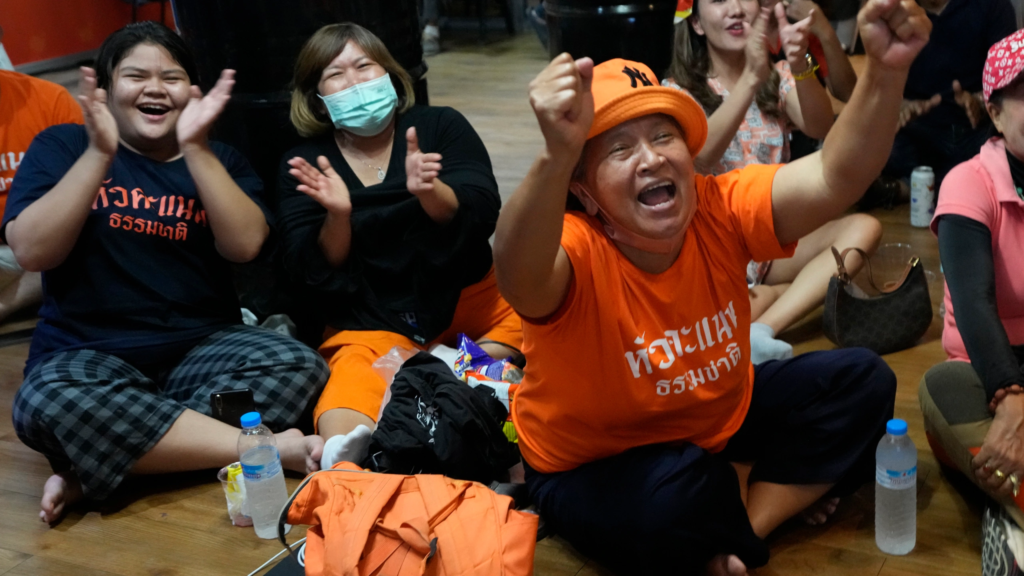The opposition party that is urging drastic reform of the nation’s institutions has received an astonishing victory from Thai voters.
According to preliminary results, Move Forward has surpassed all expectations to win 151 of the lower house’s 500 seats.

The party, Pheu Thai, led by the daughter of former prime minister Thaksin Shinawatra, is now 10 seats in front.
This is being referred to by analysts as a political earthquake that signifies a dramatic change in public opinion.Additionally, it is a blatant rejection of the two military-aligned parties that make up the present administration as well as Prime Minister Prayuth Chan-ocha, who overthrew an elected government in 2014 through a coup. The number of seats gained by the ruling coalition was merely 15%.
According to Prajak Kongkirati, a political scientist at Thammasat University, “the majority of votes reflect the need to escape from the ‘Prayuth regime’ and the yearning for change.” It demonstrates that more people than expected support the Move Forward movement’s call for change.
Move Forward supporters who identify as “organic canvassers” have already flooded Thai social media with victory messages, calling the party’s victory a “wind of change” and the “dawn of a new era.”
The youthful radicals influencing Thailand’s election
In a tweet, it was stated that “democracy cannot be taken for granted” and that “this election really tells you that only four years have passed, but the people’s thinking has changed a lot, both the establishment and the pro-democracy camps.”
Move Forward’s 42-year-old leader Pita Limjaroenrat, a Harvard University graduate, tweeted that he was “ready” to become the nation’s 30th prime minister. Pita Limjaroenrat said of the opposition party, “If they don’t adapt to the thinking and the demands, they can really lose their ground.” “We share the same aspirations. Together, we think that improvements to our beloved Thailand are feasible if we start making changes right away, he added.Once upon a time, it would have been unimaginable for a party like Move Forward to outperform all of its competitors in terms of seats and votes. Move Forward calls for significant reforms to Thailand’s government, economy, military, and even the laws defending the monarchy.

It is no surprise that these were the same problems that triggered a student-led protest movement that lasted several months in 2020. Candidates for Move Forward included some movement leaders. Young and enthusiastic voters, many of whom were Move Forward supporters, also played a significant influence in the outcome of the election, similar to the 2020 protests.
In the weeks running up to the election, the sentiment in favor of the new party was difficult to overlook. On Thai social media, a fresh wave of memes with people making large strides or jumps was widely circulated.
And that was seen in person on Sunday as individuals made oversized, exaggerated gestures to demonstrate their support. Election laws forbid voters from openly declaring their choices, therefore it was the only method to show which way they were leaning. Others campaigned in the party’s official color of orange while sporting bright orange shirts, flip-flops, and sneakers.
The candidates for Move Forward had fewer resources than their opponents and were forced to rely on social media and occasionally antiquated equipment like bicycles to spread their message. They had a much clearer vision than other parties, which was helpful.
While its reformist competitor Pheu Thai was initially elusive, Move Forward outlawed any partnership with parties connected to the 2014 military coup. The party had a reputation for taking principled stands during the previous parliament and was also young and daring.
It also benefited from what seems to be a universal desire for change among the general people. In an aging Thailand, voters under 26 make up just 14% of the 52 million voters, yet they fought hard to convince older voters to support Move Forward in order to provide their generation a brighter future.
The most pressing concern is whether the two reformist parties can form a government despite the change mandate.
The 250 senators, all of whom were selected by the military regime headed by the current PM Prayuth, are permitted to participate in the parliamentary vote to choose the next leader. Despite the fact that Move Forward and Pheu Thai together own approximately 60% of the lower house’s seats, this provides them the authority to thwart a coalition between the two.If the third-largest party, Bhum Jai Thai, with its 70 seats, joins a coalition with Move Forward and Pheu Thai, they might outnumber the senate. However, there is also a chance that the conservative group, which is losing, will use an extra-parliamentary tactic to try to oust the reformers from office.
A military takeover is doubtful, but it is possible that Move Forward will be disqualified by a court on another technicality, much like its predecessor Future Forward was in 2020.
The second question is how well Move Forward and Pheu Thai can cooperate given that their previous parliamentary relationships were occasionally tense. And while Mr. Pita, the head of Move Forward, is a brilliant legislator, he is still unproven in the more cutthroat art of putting together and maintaining a coalition.
And Pheu Thai must deal with the disappointment of its own expectations being smashed of winning, perhaps by a landslide.
Move Forward, a movement commonly regarded as an upstart, has taken up the mantle of being the protector of those opposed to conservative, military-backed rule from it. Now that it is in a coalition, Pheu Thai and its leaders must get used to being an equal, if not a subordinate partner.





